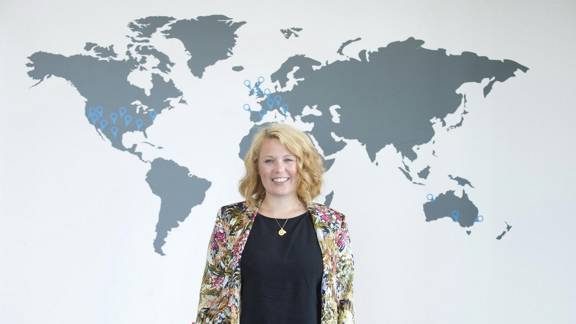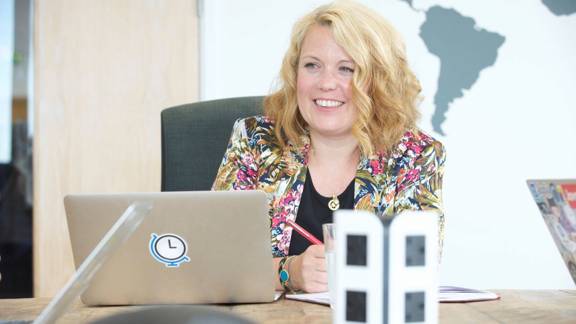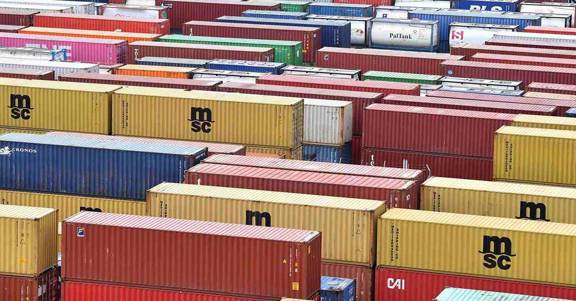Appointedd CEO'S exporting tips
Leah Hutcheon, CEO of Appointedd, explains how her Edinburgh-based start-up has revolutionised the way small businesses sell their time worldwide and offers her exporting tips.

30 Jul 2018 | 8 minute read
Appointedd's multi-timezone software opens worldwide opportunities
“Appointedd is an online booking and business management software system for small businesses who sell time. And that can be anything from a hair salon or a podiatrist to a global business development agency or a meeting room centre.
"It’s really about enabling businesses, who sell either their own time in a service or a resources time, to do that really easily online, from any platform.
"We plug in online booking tools to the business' own website, their Facebook page or any partner sites and then we manage the impact of that booking through the business.
Product-led strategy
“Exporting kind of snuck up on us a little bit. We built a product that was really tailored towards allowing cross timezone bookings to happen. From that we got a lot of interest from countries where they do a lot of business across timezones.
"Our strategy was to build that product and we knew that it would be popular overseas where there are lots of different timezones, even when a company is doing business domestically. So, we kind of knew that would be the outcome. But it wasn’t so much that we went in with a strategy around exporting, but rather it was more product-led.
Having the self-belief
“Our very first international client came to us before we were in a position to export.
"We got a call from a business development agency in Germany that has offices all around the world and people that work across different timezones, who do a lot of travelling to clients. And they were looking for a system that could allow them to be bookable by their clients in whichever timezone they were in, in their normal working hours.
"They telephoned lots of people and asked the question and found nobody was able to satisfy their needs. It was at the time when we were looking to internationalise our product − we’d started to get some interest from overseas so we know we had to handle different timezones.
"However, with this client, it was taking it a step further than we’d planned. We noticed the gap in the market by the fact that the client had spoken to so many people who said it wasn’t possible. Yet our developers believed it was possible. It was kind of just a challenge for us.
"It was very difficult at the outset − it took us six months to build the product and the updates that it needed, but we’re now the world’s first and still the only multi-timezone booking tool.
Know your strengths
“It’s really important to look at your product and be very realistic about its strengths and weaknesses and get those under control before you try to do anything on the global stage.
"As much as the opportunities are way bigger, the competition is also way bigger – you’re competing against everyone else who may have had your idea.
"Get your ‘ducks in a row’ and believe in your product. Know what your strengths are and your USPs (unique selling points), then really, just go for it.
"It’s important that you look strategically at potential markets. The world is a big place so it’s important that you go after the ‘low-hanging fruit’, just to make your job as easy as possible.
Scaling our international operations
“We’ve been exporting for about a year. We have some exciting, high profile partnerships in place now with regards to exporting. We have a partnership with a major international bank that is using the platform to deliver services to their small business customers.
"We also have a partnership with the world’s largest virtual office network that is headquartered in the US but they have offices across 52 countries – so a very international brand. We’re working with them to deliver their virtual office network with virtual assistants and we’re being resold to their 500,000 clients across the world.
"We’ve managed to negotiate some really exciting partnerships and distribution channels that have allowed us to scale more easily internationally.
Targeting early adopters
“Our biggest export market is still America but I do think that Australia will overtake that quite quickly because of our partnerships there. Australia has been a really open market to us and we have another couple of partnerships deals in the pipeline at the moment. Australia seems to really appreciate the technology that we’ve built and small businesses really understand the need for using software within their core operations.
"With regards to the American market, it’s been wonderful for us. I think America has a reputation for being an early adopter in these kinds of things and certainly that has proven true for us.
"And, for us, America was the natural market − knowing that small businesses in America are doing business domestically across timezones.

Leah Hutcheon, founder and CEO of Appointedd at her Edinburgh office
Be prepared to tailor your product for new markets
“Yes, we have adapted the product. Previously we wouldn’t have been able to handle business internationally. We originally built the product with a UK audience at the heart of it. Then, to look at overseas markets and internationalise it, we absolutely had to update the product and do some customisation to cover the different timezones.
Be ready to build relationships
"We’re really lucky as an online product that we are able to sell direct to any country that’s able to use our software, so we do get direct sales from overseas and we often get ones that really surprise us, especially in the early days.
"One of our earliest clients was a company in Kansas City: ‘we just found you on the web and it looked just like a great product so we’d thought we’d try it’, they said.
"That was a real eye-opener for us – the fact that we’re an online product means we are operating on a global scale anyway, and we are able to reach people that we don’t necessarily try to reach. They’re just able to find our product.
"But I think for us, from a growth perspective when it comes to exporting, partnerships have been so important to us. Whilst we can pick up ad-hoc organic sales from overseas we haven’t yet really spent any marketing budget to attract overseas clients. But what we have done is spent a lot of time and energy on building relationships with people who we believe can be a key to unlock that territory.
Be open-minded to opportunity
“It’s really important that you stay open-minded. For us, we were surprised by some of the opportunities that came to us and it would’ve been really easy to dismiss them, saying we don’t have time for that.
"As a start-up, every day is super busy and you do know you have to stay focused as a small company. But what we’ve tried to do is see the opportunity wherever it lies, and really see how far we can push that to make the most of it.
"Our partnership with a major international bank came through a meeting we had in Las Vegas. We’d gone over to Las Vegas supported by Scottish Enterprise to exhibit at a trade show.
"The main aim of our visit was to showcase our new cross timezone tools to other start-ups who were exhibiting. But while we were over there we visited a more corporate trade show, and it was there we met the company that led to our deal with a major international bank.
Be resourceful
“I think the biggest challenge for in terms of exporting has been resource allocation. We’re a small team of four at the moment. Any project we embark on does take us away from our core aims, so managing those resources and making sure that we don’t get too distracted has been probably been the biggest challenge.
"There’s always going to be a financial aspect to exporting and the way we’ve tried to manage that is by being savvy about the ways in which we approach people. Email marketing has been a really great tool for us to reach potential partnerships and see if there is any interest there.
"It’s about making the most of the resource you have.
Be culture-savvy
“Outside of that, there are the more practical challenges and quirks of just how people do business in other countries. We’re in talks with a Japanese company and that’s been a learning curve. You need to understand their traditions and conventions to represent your company in the best possible way.
"One of the wonderful things about the American market is that they are so decisive and there’s a real kind of action there that sometime doesn’t happen here in the UK. Although I’ve learned that you can’t do the modesty thing that we often do in the UK – you have to really go out and sell your product.
Exporting is easier than you might think
“The commercial benefits of exporting are undeniable. We’re now able to operate on a global playing field, so the prize is going to be so much bigger relative to the UK market, which is relatively small. If you have a product that can be exported then I would recommend it to anybody.
"The personal benefits too have been amazing. It’s allowed me to travel with members of the team which has been wonderful for us – not just from a bonding experience aspect but from learning how other cultures do business.
"In some ways, it’s as easy if not easier to do business internationally because firstly, it’s a bigger stage so you don’t need to appeal to everyone – you can be very niche and still have access to a huge market. Secondly, the UK, and Scotland in particular, is a wonderful brand to be associated with – people know that we build great products and there’s a real quality of product that comes from the UK.
Enjoy the journey
“You don’t have to close every deal. You don’t have to have the tenacity that you necessarily would when you’re looking at things on a domestic scale because there’s so much more business out there.
"Probably we’ve wasted a bit of time on deals that haven’t come to anything, while we’ve had some amazing deals come ‘out of the blue’. For me that has been a big learning point.
"I would like to say to other small business starting out in exporting to just enjoy it. It does feel really stressful at the beginning because you feel a little out of your depth. But you’ll start to enjoy the quirks, the differences and the opportunity that’s there and look at how you can maximise it and make things better.
Finding the right connections
“The support we’ve had from Scottish Enterprise has been amazing. We’re an account managed company, so that has brought a lot of benefits to us − we’ve been able to get the product and the team to a point where we were able to export – it’s been invaluable.
"Then we’ve had support from Scottish Development International to help us fund the trip to the US that we did and connect us with the GlobalScot network as well as put us in touch with other people who’ve done it before.
“Scottish Enterprise support has been second-to-none. We’re very lucky to be building a company in Scotland because I do think we have world-class support here and I’d encourage companies to go out there and ask for the support that they need."

Leah Hutcheon, founder and CEO of Appointedd
Get a tailored export progress report
Use our export assessment tool to take a strategic approach to exporting. It will help you understand what stage you’re at, what your next steps are and what support is available to help you succeed.
You might also be interested in
-

Connecting OPEX to the GlobalScot network
Learn how Scotland’s international business network, GlobalScot, helped OPEX develop its international expansion plans.
-

Find the right export market
How to find the right overseas market for your business, including international market research resources and live opportunities.
-

Routes to international markets
Learn about the different routes a product can take to international markets to find the best fit for your business.
-
Sign up to exporting email updates
Stay updated with the latest exporting and ecommerce news, events and international market opportunities for your business.
